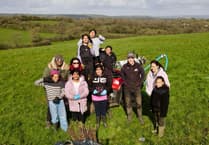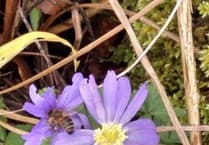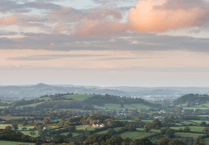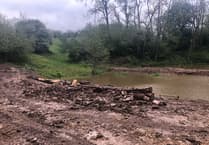This Valentine’s Day, West of England residents can let their love grow and even spread the love to help out the region’s fuzzy friends - bees.
That’s according to regional Mayor, Dan Norris, who is urging locals to check out his five simple steps to help pollinators, whose services are worth around £1.8 billion a year in boosting yields and the quality of yummy fruit and veg - including here in the West of England region.
People can do things like get green-fingered by planting more flowers that are rich in nectar and pollen, eat local honey and ditch those bee-harming pesticides once and for all, says the Mayor.
This gift guide comes as studies show the UK has lost around 13 bee species in recent years, with another 35 at risk because of climate change, habitat loss, and bee-killing pesticides.
Dan Norris and big regional firm Yeo Valley last month teamed up to call on ministers to stop ignoring the science, and block a bee-killing pesticide called 'Cruiser SB' from being used.
Mayor Dan Norris, who is delivering on his pledge to make the West of England the Bee and Pollinator Capital of the UK, said: “It’s fair to say bees haven’t been feeling the love of late - not least because of things like the climate crisis, and those bee-harming pesticides.
“The good news is there are loads of simple things we can all do to help on the most romantic day of 2024, and beyond - from eating local honey, to leaving those hibernating pollinators well alone!
“Let’s show our pollinator friends some love this Valentine’s Day.”
Dan Norris has introduced the £1m Pollinator Fund and annual Bee Bold Awards celebrating organisations going "above and beyond" to support pollinators to help deliver on his "Pollinator Capital" pledge.
Mayor Norris’s 5 steps to help pollinators this Valentine’s Day:
- Get green fingers - grow more flowers in your garden, balcony or allotment that will flower throughout the year. From shrubs to herbs, every pot will help
- Leave hibernating insects alone - avoid disturbing or destroying nesting or hibernating insects, in places like hedgerows, trees or walls. This is important to make sure the next generation can survive this winter and to start again this coming spring
- Eat local honey - you’ll be supporting a local business (think Yew Tree Farm in Bedminster Down or Easter Compton Farm Shop in Olveston), and their bees. It’s a win win!
- Ditch the pesticides for good – pesticides create a toxic environment for all creatures but are especially harmful for bees and other pollinators. Not using them is better for you, your family, pets and the planet
- Make your own very Bee Hotel - you can do this using recycled materials to providing spaces for solitary bees to nest. Friends of the Earth have put together a helpful explainer on how to make your very own bee sanctuary: https://friendsoftheearth.uk/bees/make-a-bee-house




